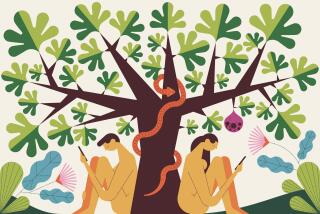AIDS Has Altered U.S. Sex Habits
- Share via
ATLANTA — Almost three in every 10 Americans have dramatically altered their sexual behavior to lower their risk of contracting AIDS, and those at greatest risk--people with multiple sex partners--are most likely to be taking precautions, leading authorities on sexual behavior said Friday.
Their conclusion is based on a new analysis of the most sweeping scientific survey of American sexual practices since the Kinsey reports almost half a century ago. The insights were gleaned from a landmark study of adult sexual behavior called the National Health and Social Life Survey, which covered the sexual habits and attitudes of 150 million people.
In research presented to the American Assn. for the Advancement of Science, sociologists used more detailed studies of the survey results to shed new light on the nature of sexual attraction, sexual identity and the long-term effects of childhood sexual abuse.
Any changes in sexual behavior are of interest to public health officials because they could help stem a rising tide of sexually transmitted diseases that infect millions of people, with consequences ranging from chronic illness and infertility to death.
To avoid the threat of AIDS, people who have had many recent sex partners are almost five times more likely to curtail their sexual activity, twice as likely to select their sex partners more carefully, and three times as likely to use condoms as more monogamous couples, according to the researchers from the University of Chicago and the State University of New York.
As many as 30% of adults in the United States reported making some changes in their sexual behavior because of the AIDS threat. Of those, 29% are using condoms more frequently, 26% said they are more monogamous, 25% said they are choosing their partners more carefully or getting to know them better before being intimate. Eleven percent said they abstain from sex because of the fear of AIDS.
“People are responding to the fact that sex is a potentially life-or-death decision,” said Joel A. Feinleib, a public policy analyst in Chicago.
“However, a significant group (one-third of heterosexual men with multiple partners) has not changed their behavior,” he said.
The research presented Friday forms the second wave of studies stemming from a 1992 survey conducted by the University of Chicago’s National Opinion Research Center and represents the results of detailed interviews with 3,432 randomly selected Americans between the ages of 18 and 59.
In other findings, researchers determined that sexual identity is more ambiguous than previous studies have shown. Many assume that people who have had a single homosexual experience also will have homosexual feelings and will think of themselves as gay or bisexual. But researchers presented evidence to show that when it comes to members of the same sex, behavior, desire and identity do not necessarily overlap.
In fact, only half the men who have had a homosexual experience since they turned 18 considered themselves to be homosexual or bisexual. Fewer than 40% of women who have had at least one homosexual experience since turning 18 consider themselves to be homosexual or bisexual.
“Somehow in our society, we have come to believe that homosexuality is a single phenomenon,” said University of Chicago sociologist Stuart Michaels. “This material disputes that notion. It is much more complicated.”
The studies also contradicted a widely held image of promiscuity among all homosexual men. The survey revealed essentially no differences between active homosexual and heterosexual men in the frequency of sex.
In an examination of childhood sexual abuse, the researchers found serious long-term effects among both men and women, including higher levels of sexual dysfunction and more problems with their current relationships.
One in 10 women said that as children they had sexual contact with an adult. Slightly fewer men said they had been sexually abused in childhood.
Two-thirds of those who acknowledged sexual contact with an adult while they were children were much more likely to have sexual problems when they grew up, the researchers said. As adults, they were more likely to have riskier sexual lives, with a greater likelihood of contracting a sexually transmitted disease. Almost all of those who reported childhood sexual contact--93%--said it involved someone they knew. Children who were not raised by both their natural parents were twice as likely to have such sexual contact, the researchers said.
“The popular image of the child molester on the playground is not representative of this experience,” said Chicago sociologist Christopher Browning.






